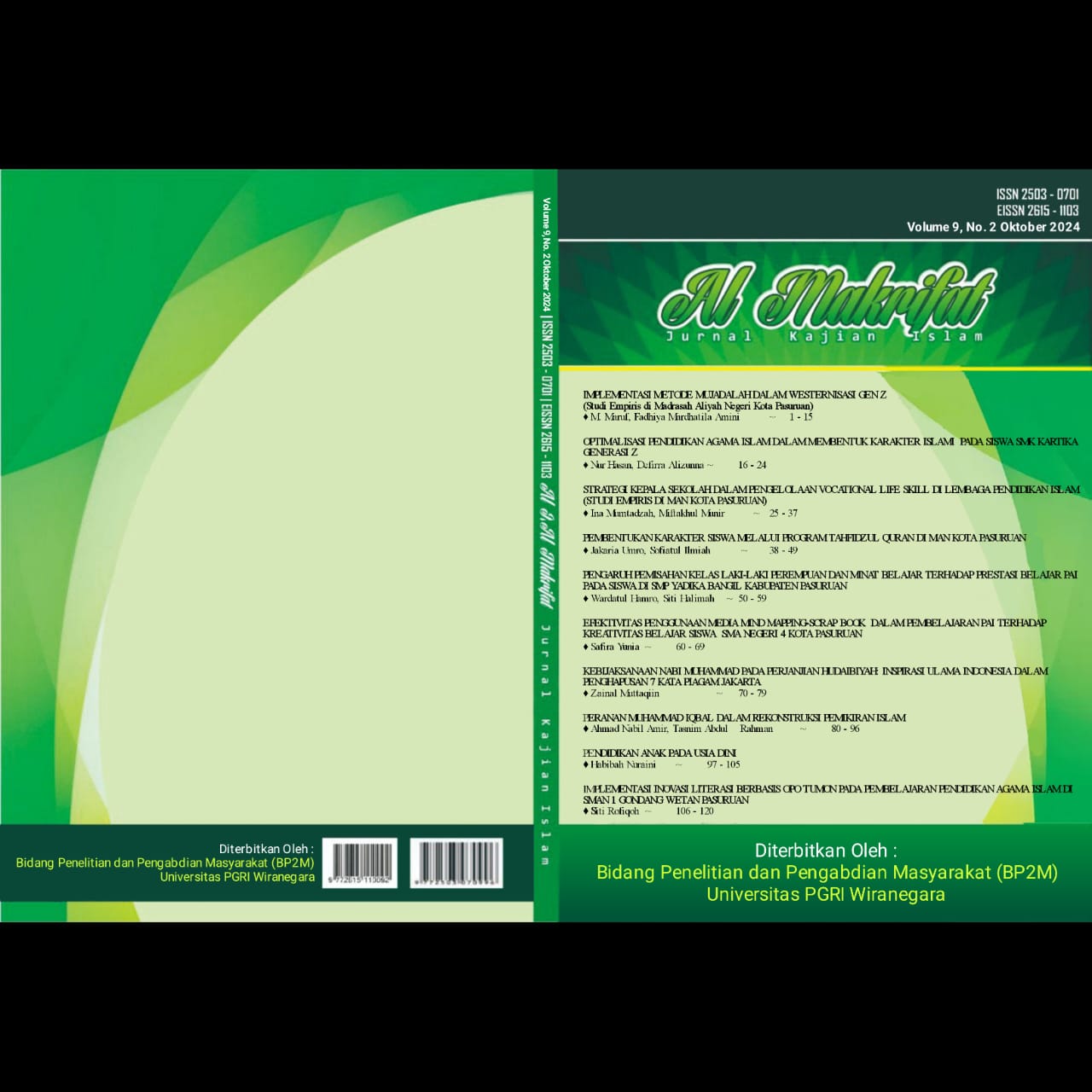Implementasi Inovasi Literasi Berbasis Opo Tumon Pada Pembelajaran Pendidikan Agama Islam Di SMAN 1 Gondangwetan Pasuruan
Abstract
Improving literacy among students is one of the primary goals in modern education systems, particularly in the subject of Islamic Religious Education (PAI). Good literacy encompasses not only the ability to read and write but also critical and analytical thinking skills relevant to real-life contexts. However, conventional teaching methods often fail to meet these challenges. Therefore, innovation in teaching methods is essential. The OPO TUMON method (Observation, Potention, Organization, Trend, Useful, Meaningful, out of the box, and Management) emerges as an innovative solution to enhance literacy and student engagement in PAI learning. The objectives of this study are: 1) to understand the implementation of Literacy Innovation Based on OPO TUMON in Islamic Religious Education Learning at SMAN 1 Gondangwetan Pasuruan; 2) to identify the supporting and inhibiting factors of implementing Literacy Innovation Based on OPO TUMON in Islamic Religious Education Learning at SMAN 1 Gondangwetan Pasuruan. This study uses a qualitative approach of case studies. The subjects of the research are PAI teachers at SMAN 1 Gondangwetan Pasuruan, while the informants include the Principal, Vice Principal of Curriculum, and students of SMAN 1GondangWetanPasuruan. Data collection techniques include observation, interviews, and documentation. Data validity techniques use source triangulation and method triangulation. Data analysis employs descriptive analysis techniques. The research results show that: 1) In the implementation of literacy innovation based on OPO TUMON in PAI learning, students are actively involved in observing phenomena and solving problems relevant to the material. Teachers then observe to understand the characteristics of each student and plan appropriate learning. By using digital technology, learning becomes more engaging and relevant to students' everyday lives. 2) The success of this literacy innovation implementation is supported by several key factors, including the commitment and enthusiasm of teachers, the availability of adequate school facilities, and full support from school management. Meanwhile, the inhibiting factors in the implementation of OPO TUMON include limited time in the crowded learning schedule, a lack of adequate literacy resources, and the need for ongoing training for teachers. Keywords: Implementation of Literacy Innovation, OPO TUMON, Islamic Religious EducationReferences
Sari Jumita. “Manajemen Program Literasi Dalam Meningkatkan Kualitas Guru Di Tk Bintang 33 Ujung Batu” (n.d.): 1–12.
Suryana Ermis, Aprina Marni Prasyur, dan Harto Kasinyo. "Teori Konstruktivistik dan Implikasinya dalam Pembelajaran." JIIP-JurnalIlmiahIlmu Pendidikan 5.7 (2022): 2070-2080.
B. Uno Hamzah dan Lamatenggo Nina. 2022. Teori Kinerja dan Pengukurannya. (Jakarta: Bumi Aksara).
Romzi Moh. et al. 2024. "Struktur Dan SistemOrganisasi Pendidikan Islam Yang Dinamis." Ma'arif Journal of Education, Madrasah Innovation and Aswaja Studies 3.1.
Firman Nugraha. 2020. Pendidikan dan Pelatihan: Konsep dan ImplementasidalamPengembanganSumber Daya Manusia. (Jakarta: Litbangdiklat Press).
Sulih Aji Pangestu, SetyosariPunaji, dan Kuswandi Dedi. "Analisis Persepsi Mobile Learning Readiness Dengan Menggunakan Technology Acceptance Model Dalam Pembelajaran Bahasa Jawa." JKTP J. Kaji. Teknol. Pendidik 6.3 (2023): 152.
Saksono Herie, et al. 2023. Teori Belajar dalam Pembelajaran. (Batam: Cendikia Mulia Mandiri)
Hamidulloh Ibda, 2022. Belajar Dan Pembelajaran Sekolah Dasar: Fenomena, Teori, Dan Implementasi. (Semarang: CV. Pilar Nusantara).
Rahmat Abdul dan Husain Rusmin. 2020. Manajemen Berbasis Sekolah Untuk Perbaikan Mutu Pendidikan Sekolah Dasar. (Yogyakarta: Zahir Publishing).
Telaumbanua Fransiskus Faozisokhi, et al. "Analisis Pelatihan dan Pengembangan Guru dalam Meningkatkan Kinerja Guru di SMP Negeri se-Kecamatan Hiliduho Kabupaten Nias." Management Perspective: Jurnal Penelitian Manajemen 1.1 (2024): 15-29.
Kamilah Nurul dan Windayana Husen. "Analisis Peran Teknologi Digital Sebagai Solusi Problematika Belajar Online yang Berkelanjutan." Jurnal Riset Madrasah Ibtidaiyah 2.1 (2022): 138-145.
Gusman Burhanudin Ata, et al. "Strategi Kepala Sekolah pada Kepemimpinan Transformatif dalam Meningkatkan Akademik Siswa MAN 4 Kebumen." Akademika: Jurnal Manajemen Pendidikan Islam 3.2 (2021): 142-162.
Fadhli Mulkan dan Hafni Sahir Syafrida. 2020. Keterampilan Manajerial Efektif, (Medan: Yayasan Kita Menulis), h 12.
Elfrianto, Utama Indra, dan Amin Zulkifli. 2024. Manajemen Kinerja Guru Dalam KonteksKurikulum Merdeka; Peningkatan Efektivitas Pembelajaran. (Medan: Umsu Press).
Iswahyudi Muhammad Subhan, et al. 2023. Kebijakan Dan Inovasi Pendidikan: Arah Pendidikan di Masa Depan. (Jambi: PT. Sonpedia Publishing Indonesia).




